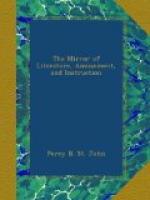* * * * *
RETROSPECTIVE GLEANINGS.
* * * * *
THE STATIONERS’ COMPANY.
It appears, from the most authentic records, that the company of stationers, or text-writers, who wrote and sold all sorts of books, formerly in use—namely, the A.B.C., with the Paternoster, Ave, Creed, Grace, &c. to large portions of the Bible, and even to the whole Bible itself, dwelt in and about Paternoster Row. Hence we have in that neighbourhood, Creed Lane, Amen Corner, Ave Maria Lane, &c., all which places are named after some scriptural allusion. Here dwelt also turners of beads, who were called Paternoster-makers, as we read in a record of one Robert Nikke, “Paternoster-maker and Citizen,” in the reign of Henry IV. The company of stationers is of great antiquity. By the authority of the lord mayor and court of aldermen, they formed into a guild, or fraternity, in the year 1403, and had their ordinances made for the good government of their fellowship. Thus constituted, they regularly assembled, under the government of a master and two wardens. Their first hall was in Milk-street.
H.B.A.
* * * * *
TITLES.
“Princes have but their titles
for their glories,
An outward honour for an inward toil;
And, for unfelt imaginations,
They often feel a world of restless cares;
So that, between their titles and low
name,
There’s nothing differs but the
outward fame.”
SHAKSPEARE.
The Romans gave the titles of Africanus, Asiaticus, Macedonicus, Numidicus, Parthicus, &c., in memory of the victories obtained over the people of those countries. The Emperor of China, among his titles, takes that of Tiensu, son of Heaven. The Orientals are extremely fond of titles: the simple Governor of Schiraz, for instance, after a pompous enumeration of qualities, lordships, &c., adds the titles of Flower of Courtesy, Nutmeg of Consolation, and Rose of Delight.
The King of Spain, after the old Roman manner, has a whole page of titles, to express the several kingdoms and signories of which he is master. Henry IV. of England had the title of “Grace” conferred on him; Henry VI. that of “Excellent Grace;” Edward IV. that of “High and Mighty Prince;” Henry VII. “Highness;” Henry VIII. “Majesty,” (and was the first and last that was styled, “Dread Sovereign;”) and James I. that of “Sacred,” or, “Most Excellent Majesty.”




